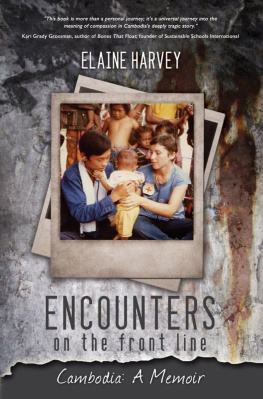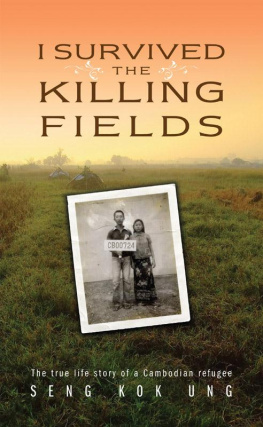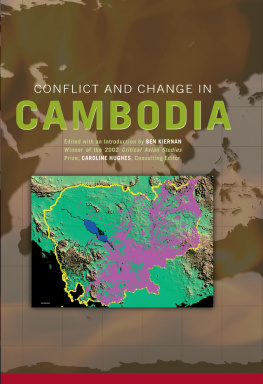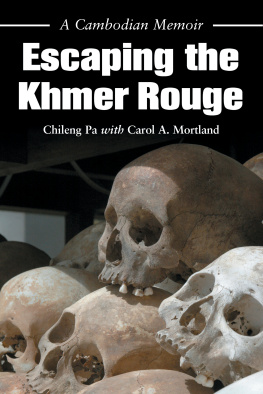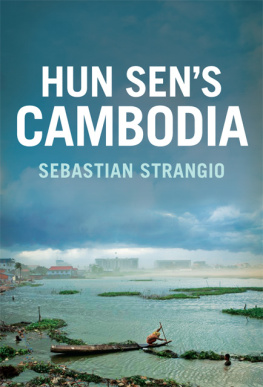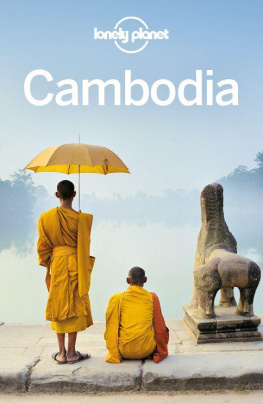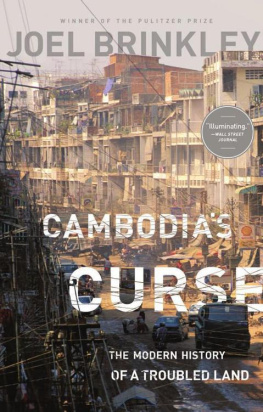Encounters on the Front Line
Cambodia: A Memoir
Copyright 2015 by Elaine Harvey
All rights reserved. No part of this book may be used or reproduced in any matter without prior written permission.
Promontory Press
www.promontorypress.com
ISBN: 978-1-927559-66-6
eISBN: 978-1-9275596-7-3
Cover art by Marla Thompson of Edge of Water Designs
Typeset by One Owl Creative in 12 pt Garamond
Author photo by Pamela Gutrath
Printed in Canada
for Sam Ath
a man of courage and resilience
and all the Khmer
who enriched my journey.
Disclaimer
I have attempted to document historical context, events and conversations accurately. A few names and identifying details have been changed to protect the privacy of these individuals. The Khmer were always forthcoming with their stories and I never probed more than circumstance allowed. My intentions were to honour the people I met on my travels in Cambodia.
Contents
Introduction
In April of 1975, after five years of civil war, Cambodia fell to the brutal regime of the communist Khmer Rouge. Democratic Kampuchea, as it was then called, was cut off from the world as Pol Pot, the revolutionary leader of the Khmer Rouge, imposed his four year reign of terror. The death toll was close to two million people, one quarter of the countrys population, at that time.
I knew little about these staggering events until the autumn of 1979, when Cambodia caught the worlds attention. Tens of thousands of Cambodians were fleeing to the border of Thailand, escaping widespread famine and the conflict between the defeated Khmer Rouge and the Vietnamese forces occupying the country. Humanitarian organizations poured in to the border areas, mounting one of the largest international relief operations of the twentieth century.
My interest in world affairs, particularly in the developing countries, was strong. Id been to Asia before, had travelled to unusual and remote destinations, and was seeking a way to contribute as a nurse, to a better world. Without hesitation I signed up with the Canadian Red Cross, took a flight into the unknown and found myself immersed in a profound moment of history. By February 1980 I was working on the war-torn Cambodian border.
The six-month mission on the border was a distressing and disturbing time, but also a time of inspiration and awe. Face to face with the aftermath of genocide, famine, torture and terror, I met a people as gracious as the lotus blooming in muddy waters.
Less than three months after returning to Canada, the Canadian Red Cross recruited me for another six-month mission, providing disaster relief for the nomadic population in the Horn of Africa. I worked in the desert of Djibouti, a country of rock and sand, its people suffering from a severe drought.
Witnessing the trauma of the Cambodian refugees, as well as the rapid cultural transition to another disaster zone in the same year, resulted in my own emotional upheaval. A year of restless days and sleepless nights ensued.
The insomnia eventually subsided and life resumed its course: marriage, family, studies, travel and work. Nursing continued to bring me close to the boneworking with poverty, trauma and suffering, in my own country, in my own small town.
Why did I go to Cambodia? Was I playing out a childhood dream of exotic escape attached to a noble cause? Was I seeking some deeper meaning to life? Was I simply responding to a heart- breaking humanitarian crisis, hoping to make a difference?
I did not fully understand the impact of the year in Asia and Africa until later in my life. I was not a victim of war, starvation or environmental disaster, but I was a witness. As a witness, I came to understand that front lines take a toll in our lives. They test how far we will go, how much we will give and how deep we will travel.
Do not forget us was the haunting call of the refugee. Come back to Cambodia. An interplay of memory: the passion of involvement, the refugee and the front line, were etched on my heart.
Nearly three decades later, I returned. I travelled many roads, volunteering in an orphanage and an AIDS hospice. I would learn about struggle and peace, suffering and hope, life and deathin a country that was not mine.
Cambodia was my teacher; my encounter as hard as shrapnel embedded in flesh, as soft as the fragrance of jasmine, and as perplexing as the beguiling smile of its people, the Khmer. The smile, offered freely to foreigners, as if to say I am fine, sok sabay, despite all that befell our cherished land.
My journey was a pilgrimage, a quest of the heart, a longing: to meet the new face of Cambodia and honour the one that I left behind.
Chronology
1953: King Norodom Sihanouk declares Cambodias independence from France.
1960-70: The Cambodian communist party, known as the Khmer Rouge, emerges.
1965-73: The US began a four year long carpet-bombing of Cambodia, to eliminate the Vietnamese communist forces in Cambodia. The resulting socio-political upheaval contributed to the rise of the Pol Pot regime. The rural population flees to Phnom Pehn, the capital, looking for safety from the bombing.
1970: King Sihanouk overthrown by right-wing coup detat.
1970-1975: Cambodian Civil War, between the Khmer Rouge backed by China and the Khmer Republic, under Lon Nol, supported by the U.SA.
1975, April 17: Phnom Penh falls to the Khmer Rouge. Forced evacuation of the entire city to the country. Khmer Republic party members executed; Lon Nol escapes. All foreigners expelled. 1975 is named Year Zero.
1975-1979: Under the Khmer Rouge with Pol Pot as Prime Minister, Cambodia withdraws from the world. Renamed Democratic Kampuchea. A reign of terror.
1979, January: Phnom Penh is captured by the Vietnamese. Communist puppet government with Khmer Rouge defectors. Widespread famine throughout the country, now called the Peoples Republic of Kampuchea. The Khmer Rouge retreat to the border of Thailand. Hundreds of thousands of civilians flee to the Thai border.
1980-1989: Warfare between the Khmer Rouge and the Vietnamese continues. The Khmer Rouge hold a seat at the United Nations as the legitimate power in Kampuchea.
1989: Vietnam formally withdraws from Kampuchea and the State of Cambodia is established.
1991: Prince Sihanouk returns to Cambodia, from his exile in China.
1990-1992: United Nations Transitional Authority (UNTAC) sends twenty thousand peacekeepers to supervise and promote democratic elections.
1993: Sihanouk is re-instated as king in the Kingdom of Cambodia.
1998: Death of Pol Pot from unknown causes. Collapse of Khmer Rouge movement.
2004: Sihanouks son, Norodom Sihamoni, instated as king of the constitutional monarchy.
2009- 2010: The International Tribunal for war crimes against humanity and genocide takes place in Phnom Penh.
2011: Hun Sen, Prime Minister of the Cambodia Peoples Party (CPP) is the longest-serving leader in Southeast Asia. In power through various coalitions since 1985.
The Khmer Rouge and Pol Pot
To preserve you is no gain; to destroy you is no loss.
- Khmer Rouge slogan.
Pol Pot, the leader of the Khmer Rouge regime, is considered one of the most heinous despots of the 20th Century. The goal of his totalitarian ideology was to transform Cambodia into a self-sufficient agrarian state, with the cultivation of rice as the cornerstone of this vision. It was a society where young and uneducated peasants held absolute power over the urban, educated class. The revolution justified human life as irrelevant and expendable.

